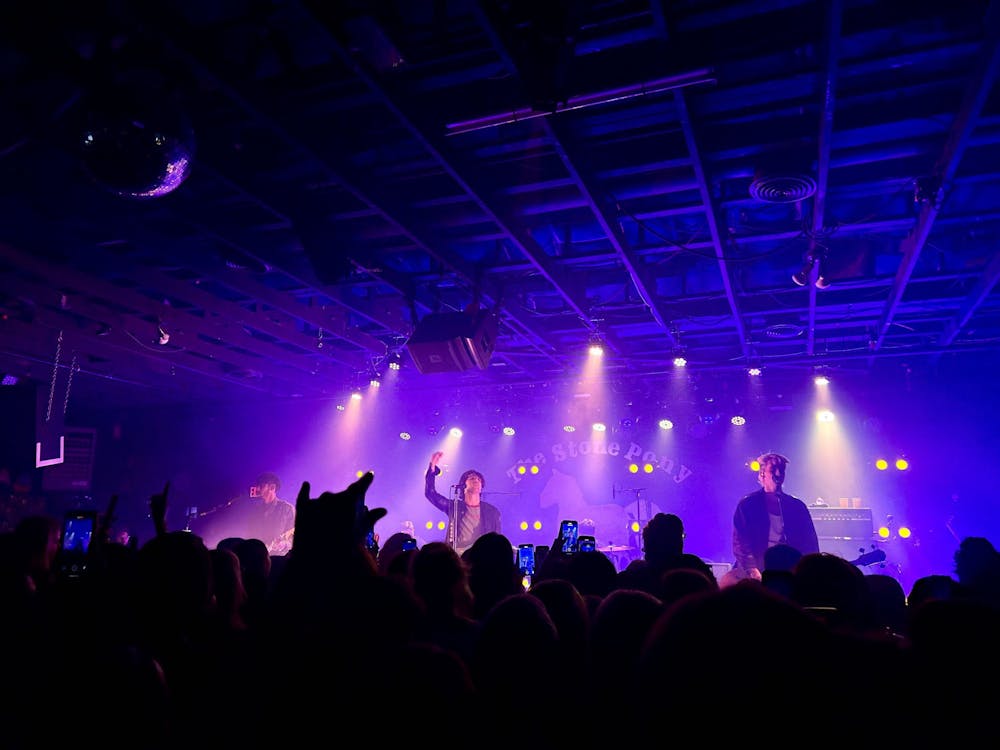The crowd stands shoulder to shoulder. Adults in their 40s stake out the back of the venue. Behind them, signed posters of Bruce Springsteen, vintage guitars, and faded Stone Pony flyers dating back 50 years wrap the walls. The younger fans swarm as close to the stage as possible. Inhaler concerts will always be a melting pot of generations, from older fans eager for the live sound of Bono, the 64–year old father of Inhaler’s lead singer Elijah Hewson, to Gen Z enthusiasts hungry for the band’s distinct basement rock sound, which echoes the Arctic Monkeys, Catfish and the Bottlemen, and the Strokes.
Somehow, even with its audience seeking many different things from their sound, Inhaler has always been the masters of their own identity, creating their own brand of alt–rock, raw and individual. The band has experimented in small doses with new sounds, expanding off of their grungy, guitar heavy and bass–filled classics to incorporate electronic bridges, eerie loops, and misty melodies. From softer ballads such as “Valentine” to head pumping bridges like that of “Dublin in Ecstasy,” Inhaler’s sound arises from a fresh blend of comprehensive guitar riffs, raspy lyrics, and a heavy, fast–paced rhythm.
Despite Hewson’s consistent efforts to distance himself from the image and publicity that comes with having a superstar father, the band was given wide attention from the start not just for their striking sound, but for their attachment and legacy to greatness. Their debut album, It Won’t Always Be Like This, was the number one record on the UK Album Charts in 2021, and their sophomore album, Cuts and Bruises, reached second on the Charts in 2023. Despite their success from the get–go, they have always been glued to the idea of “serving the song." What “it boils down to is the essence of the song and the melodies and the chords and the lyric,” Hewson told Louder Sound. But after their latest show in Asbury Park, the band seems to be slipping from commanding a distinct image, instead falling into the grasp of the commercialized mainstream.
Following their opener, Benches, an up–and–coming Southern California quartet, an overly eager crowd waited for Inhaler. They emerged onto a foggy stage with mature new looks. Bassist Bobby Keating rocked a bleach–dyed mullet and leather jacket, while the three other members, drummer Ryan McMahon, lead guitarist Josh Jenkinson, and lead singer Elijah Hewson each sported new and noticeably scruffy beards and unkempt hair. Seeing the band on stage after seeing them live twice in the last two years felt like I was watching four strangers. Their looks felt forced, too in–your–face for the laid–back “we’re only here to make music” mentality that had defined the band since they began playing after school 12 years ago.
In mid October, Inhaler dropped the first hints that they would be entering a new “era” by redoing their Instagram, erasing the hundreds of previous posts they have made since their start: snippets of backstage moments, videos made on the bus in–between shows, and photos of the band posing with crowds after shows.
The new posts on their Instagram scream professionalism. From up–close, high contrast photos of Bobby Keating, illuminating the iciness of his blue eyes and hairs of his noticeably (kinda gross) unibrow, which give the image a sense of edginess and intimacy, to photos of Elijah Hewson with strands of sticky and sweaty hair dangling over his face, playing the guitar and grinning at a teen girl in the crowd, who smiles back at him with goo–goo eyes, it all feels noticeably fake—not only to those who have known the band since the beginning, but those who are just seeing them for the first time as well.
“We’ve got some stuff coming soon,” Elijah Hewson says through heavy breaths with an Irish accent after finishing “Totally” and taking a drag of the cigarette tucked behind his ear. “Here’s one of them,” he pants, as the lights dim to a deep orange color, showing waves of steam from body heat rising off of the wall of a crowd. As he begins “Your House,” Hewson grabs the microphone stand, and the first notes that slip out of his mouth transport the crowd to Bono’s deep and gravelly voice. The intense guitar bridges that Keating was known for on songs such as “Who’s Your Money On” and “Falling In” are noticeably absent, and the steady rhythm Ryan sets on drums feels too simple. In this teaser for what’s to come in their new era, there is a wall between the singer and the band—the three other members serve solely as a vehicle to elevate Hewson’s voice.
“Eddie in the Darkness,” an unreleased song with a fast–paced, sludge–guitar chorus and an intense drum build up in its bridge, follows the same sound that has defined Inhaler in the past. It’s a relief to hear this return to the holistic group sound—until, during the last verse of the song, the lights fade, and a spotlight focuses on Hewson, smack dab in the center of the stage.
When bands grow in popularity, they are destined to lose at least some elements of their individuality. They must cater to a larger audience—to expand their fandom, to make songs that top more charts, to sell out larger stadiums. As I stood outside of the Stone Pony, my feet throbbing and my head sweaty, and stared at the Inhaler North America Tour poster with “SOLD OUT” written messily across the poster in thick Sharpie, I wondered if rather than being a new era, this would be a permanent change to Inhaler's identity.

